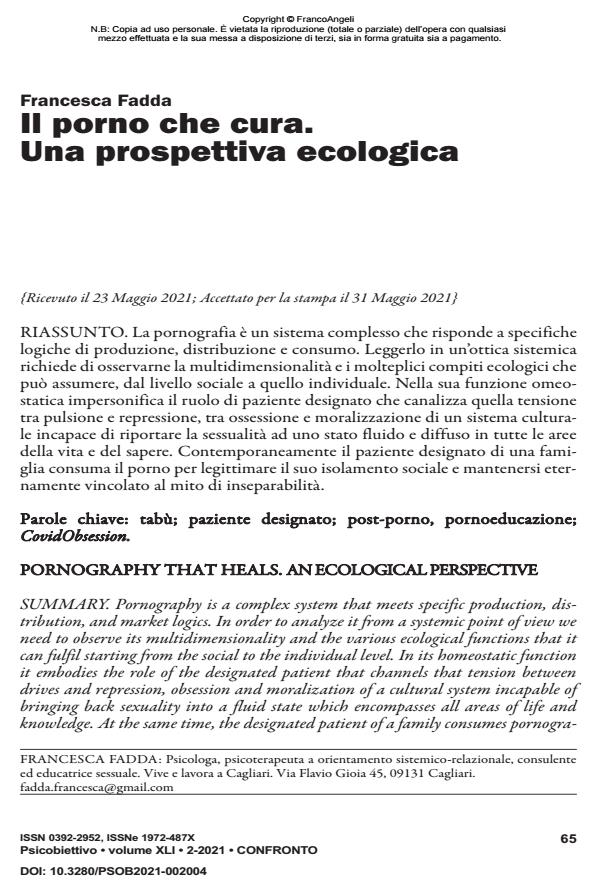Pornography that heals. an ecological perspective
Journal title PSICOBIETTIVO
Author/s Francesca Fadda
Publishing Year 2021 Issue 2021/2
Language Italian Pages 15 P. 65-79 File size 142 KB
DOI 10.3280/PSOB2021-002004
DOI is like a bar code for intellectual property: to have more infomation
click here
Below, you can see the article first page
If you want to buy this article in PDF format, you can do it, following the instructions to buy download credits

FrancoAngeli is member of Publishers International Linking Association, Inc (PILA), a not-for-profit association which run the CrossRef service enabling links to and from online scholarly content.
Pornography is a complex system that meets specific production, distribution, and market logics. In order to analyze it from a systemic point of view we need to observe its multidimensionality and the various ecological functions that it can fulfil starting from the social to the individual level. In its homeostatic function it embodies the role of the designated patient that channels that tension between drives and repression, obsession and moralization of a cultural system incapable of bringing back sexuality into a fluid state which encompasses all areas of life and knowledge. At the same time, the designated patient of a family consumes pornogra phy to legitimize their social isolation and to remain eternally bound to the myth of inseparability.
Keywords: Taboo; designated patient; post-porn; pornoeducation; CovidObsession.
- Adamo P. (2004) Il porno di massa. Percorsi dell’hard contemporaneo, Raffaello Cortina, Milano
- American Psychiatric Association (2013) Manuale Diagnostico e Statistico dei Disturbi Mentali, Raffaello Cortina, Milano
- Bateson G. (1976) Verso un’ecologia della mente, Adelphi, Milano
- Borghi R. (2020) Decolonialità e privilegio. Pratiche femministe e critica al sistema mondo, Meltemi, Milano
- Brown N. (1971) La vita oltre la morte, Il Saggiatore, Milano
- Chase H.W. et al. (2011) “The neural basis of drug stimulus processing and craving: an activation likelihood estimation meta analysis”, Biological Psychiatry, 70, 8: 785-93
- Coletti M. (2004) “Le nuove dipendenze in una prospettiva sistemica”, Psicobiettivo, XXIV: 29-40
- CovidObsession (2020) Dir. Morgana Mayer, Lucio Massa. Aborsky Produktion
- De Oliveira L., Carvalho J. (2020) “The link between boredom and hypersexuality: A systematic review”, The Journal of Sexual Medicine, 1-11.
- Freud S. (1969) Totem e tabù. Alcune concordanze nella vita psichica ei selvaggi e dei nevrotici, Bollati Boringhieri, Torino
- Freud S. (2007) Al di là del principio del piacere, Mondadori, Milano
- Frisina M. (2020) Sul bordo del caos. Complessità, terapia sistemica e dipendenze, Mimesis, Milano
- Hooks B. (2020) Insegnare a trasgredire. L’educazione come pratica della libertà, Meltemi, Milano
- Kafka M.P. (2010) “Hypersexual Disorder: A proposed Diagnosis for DSM-5”, in Archives of Sexual Behavior, 39: 377-400.
- Kronhausen P.E. (1970) Pornografia e legge, Dellavalle, Torino
- Lambiase E. (2019) La dipendenza sessuale. Diagnosi e strumenti clinici, Carocci Faber, Roma
- Marcuse H. (1968) Eros e civiltà, Einaudi, Torino
- Ogien R. (2005) Pensare la pornografia. Tutti la consumano, nessuno sa cos’è, Isbn, Milano
- Onnis L. (2005) Il tempo sospeso. Anoressia e bulimia tra individuo, famiglia e società, Adelphi, Milano Potenza M.N., Gola M., Voon V., Kor A Kraus S.W. (2017) “Is excessive sexual behaviour an addictive disorder?”, Lancet Psychiatry, 4: 663-664. DOI: 10.1016/S2215-0366(17)30316-
- Preciado P. (2009) Posporno/excitación disidente. Entrevista per Parole de Queer Prunas A. (2020) Il porno crea dipendenza? -- www.antonioprunas.it
- Quattrini F. (2015) Parafilie e devianza. Psicologia e psicopatologia del comportamento sessuale atipico, Giunti, Firenze
- Quattrini F., Spaccarotella M. (2010) “Pornografia: pornofilia, pornofobia e pornodipendenza”, Psicologia Clinica & Psicoterapia Oggi, 3: 12-20
- Spaccarotella M. (2020) Il piacere digitale, Giunti, Firenze
- Valentine Aka Fluida Wolf (2020) Post porno. Corpi liberi di sperimentare per sovvertire gli immaginari sessuali, Eris, Torino
- World Health Organisation (2018) International Classification of Deseases and Related Health Problems (ICD-11), consultabile sui cd.who.int/dev11
- Zattoni F. et al. (2020) “The impact of Covid-19 pandemic on pornography habits: a global analysis of Google Trends”, Int. J. Impot. Res.
Francesca Fadda, Il porno che cura. Una prospettiva ecologica in "PSICOBIETTIVO" 2/2021, pp 65-79, DOI: 10.3280/PSOB2021-002004